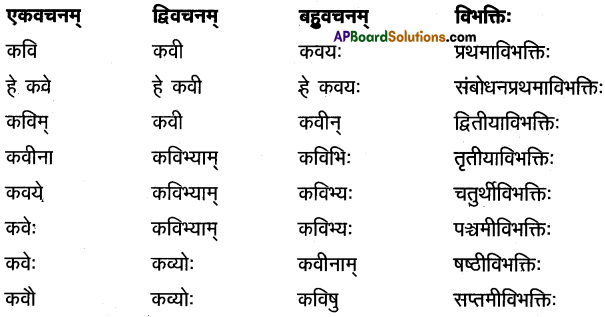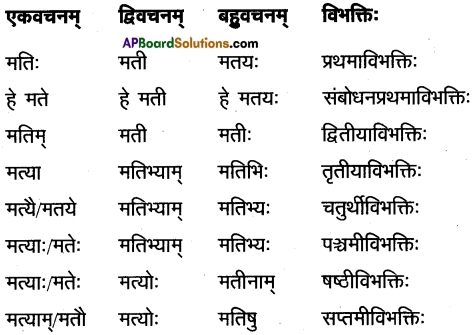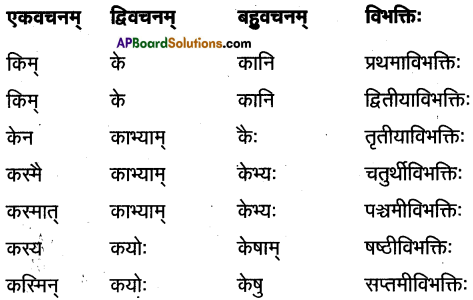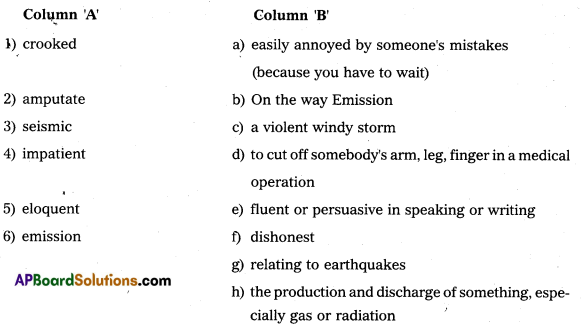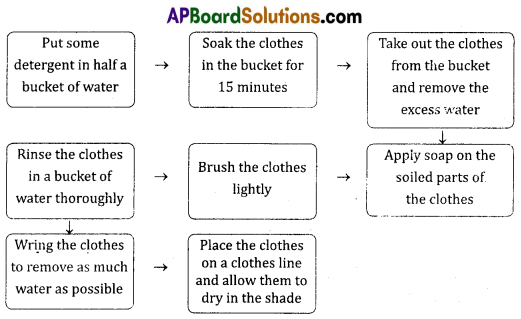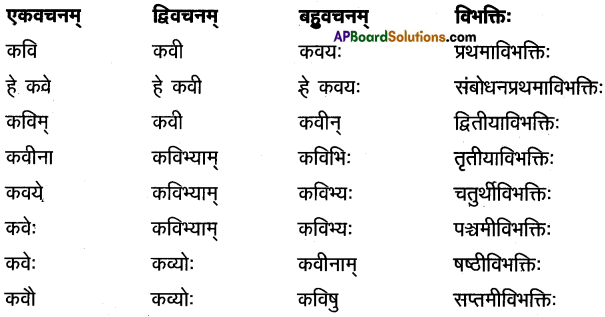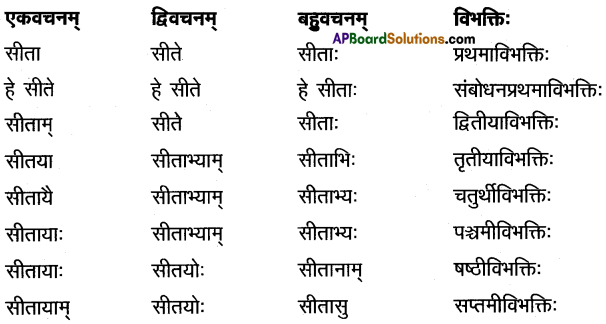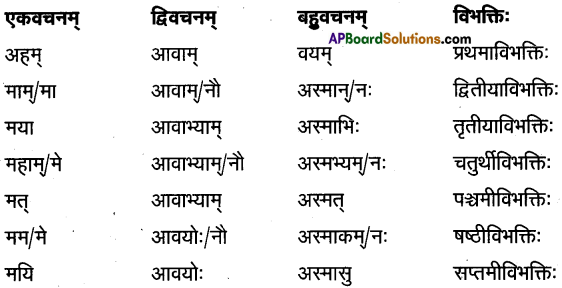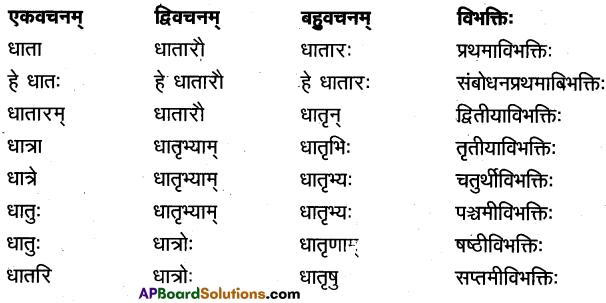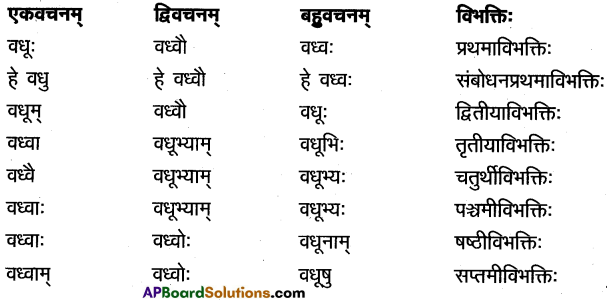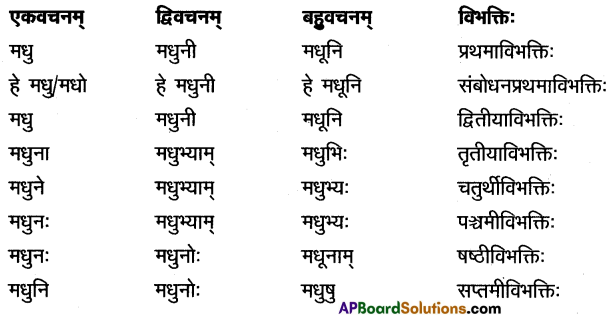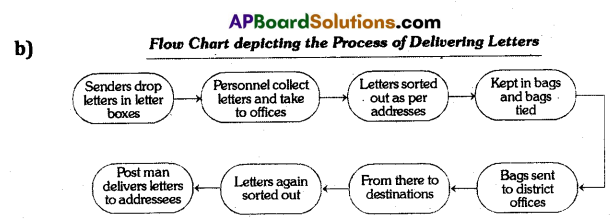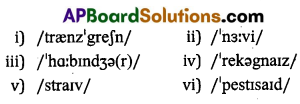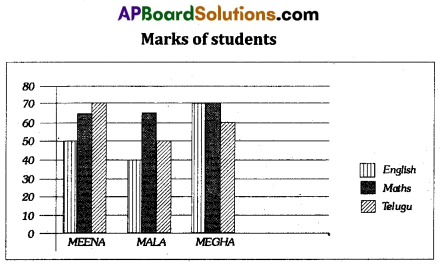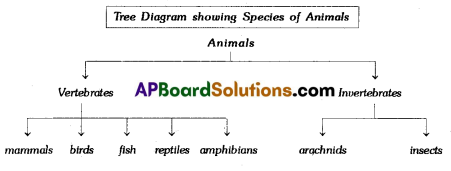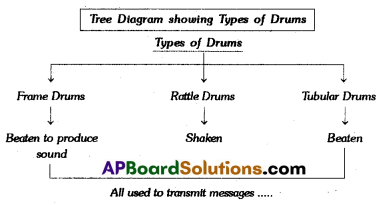Thoroughly reviewing AP Inter 1st Year English Model Papers Set 2 helps in understanding the examiner’s expectations.
AP Inter 1st Year English Model Paper Set 2 with Solutions
Time: 3 Hours
Max. Marks : 100
Section – A
I. Annotate ANY TWO of the following in 10 to 15 lines each :
(a) India is one of the most disaster prone countries in the world.
Answer:
Context : This line is taken from the essay “Disaster Management” compiled by Dr. A. Madhavi Latha. It is about disaster management. The essay is informative and useful.
Explanation: In the beginning of the essay, the writer points out that India’s geographical1 features are fitting to get natural disasters. Tsunamis, Floods, Hurricanes, Earthquakes and others are caused by natural calamities2. There is a vast3 coastline4 around the country. Natural disasters occur because of the imbalance5 in ecosystem and they are very much possible at the sea side. Bay of Bengal and Arabian sea cause this disaster and so there are frequent6 disasters.
Explanation : It is natural that the oceans move according to the weather and other changes inside. One has to know that India is disaster related land. So disaster management is essential here.
1. భౌగోళిక పరిస్థితులు
2. విపత్తులు
3. చాలా ఎక్కువైన
4. సముద్రతీరము
5. సమతౌల్యములేని
6. తరచుగా
సందర్భం : డాక్టరు ఏ. మాధవీలత గారు సంకలనం చేసిన “Disaster Management” అనబడే వ్యాసము నుండి ఈ లైను తీసికొనబడినది. అది disaster management ను గురించినదై యున్నది. ఈ వ్యాసము విషయ పరిజ్ఞానము కలది మరియు ఉపయోగకరము.
వివరణ : వ్యాసము ప్రారంభంలో, వ్యాసకర్త భారతదేశపు భౌగోళిక పరిస్థితులు, సహజమైన విపత్తులకు తగినట్లుగా ఉన్నవి. సునామీలు, వరదలు, పెద్ద తుఫానులు, భూకంపములు మరియు అలాంటివి ప్రకృతిపరమైన తీవ్ర విపత్తుల మూలంగా వచ్చును. దేశము చుట్టూరు ఒక పెద్ద సముద్రతీరం ఉంది. ecosystem (వాతావరణ పరిస్థితి) యొక్క సమతౌల్యత లేనప్పుడు, సముద్ర తీరములలో అవి సహజంగా వస్తాయి. బంగాళాఖాతము మరియు అరేబియా సముద్రము ఈ విపత్తును సృష్టిస్తాయి మరియు తరచుగా విపత్తులు కలుగుతాయి.
సాధారణ భావన : సముద్రములు వాతావరణ కదలికలను బట్టి మరియు లోపల జరిగే ఇతర మార్పులను బట్టి మారుతుంటాయి. కనుక భారతదేశము విపత్తులకు అనువైన భూమి అని గ్రహించాలి. కనుక ఇక్కడ విపత్తుల నివారణ విధానము చాలా అవసరము.
(b) Her oxygen was critically low and her Sherpa warned her that she might lose her life.
Answer:
Context: This passage is taken from the prose lesson “She Conquered Everest”. Which was compiled by Dr. B. Sowjanya. It is about the courageous lady Arunima Sinha and her life ambition.
Explanation: Arunima Sinha, the amputee was on her way to the summit of the Everest. Inspite of all the trouble and pain, she could cross the death zone also at a height of 3500 feet. She was not afraid of the dead bodies on the ground. By that time the oxygen was very low and so she was advised1 by her helper, sherpa, to becareful. Somehow she moved forward and erected2 the Indian flag on the summit on 21st May 2013. Thereafter she was saved by her helper who supplied a new cylinder of oxygen.
General Relevance: These lines show how an adventurous individual, encounters3 problems till the end of the trial. Arunima Sinha reached almost the summit but the oxygen seemed to be not sufficient. She did not hesitate4 to move forward and proved her efficiency.
1. సలహానిచ్చెను
2. స్థాపించెను
3. ఎదుర్కొనుట
4. ఆలస్యము చేయుట, వెనుకాడుట
సందర్భము : డా॥ సౌజన్య గారు సేకరించిన, “She Conquered Everest” అనే పాఠములో నుండి ఈ ప్యాసేజి తీసుకొనబడింది. అది, ధైర్యము గల అమ్మాయి అయిన అరుణిమ సిన్హా మరియు ఆమె యొక్క జీవితాశయం గురించినదై యున్నది.
వివరణ : కాలుతెగగొట్టున అరుణిమ సిన్హా, ఎవరెస్టు శిఖరాన్నెక్కడానికి ప్రయత్నిస్తోంది. చాలా కష్టాలునప్పటికి ఎలాగో 3500 అడుగుల ఎత్తున ఉన్న డెత్ జోన్ ను చేరింది. అక్కడవున్న శవాలను చూచి భయపడిపోలేదు. అప్పటికి ఆక్సిజన్ చాలా తక్కువగా ఉన్నది. అందుచేత ఆమె సహాయకుడైన షేర్పా ఆమెను జాగ్రత్తగా ఉండుమని సలహానిచ్చాడు. ఏదోవిధంగా ముందుకు పోయి ఆమె 2013 మే 21న ఆ శిఖరం చేరి భారత జాతీయ పతాకం స్థాపించింది. తరువాత సహాయకుడు క్రొత్త ఆక్సిజన్ సిలిండరు తెచ్చి ఆమెను బ్రతికించాడు.
సాధారణ భావన : ఒక ప్రయత్నంలో నున్న సాహస వ్యక్తి చివరి వరకు సమస్యలను ఎదుర్కొంటూనే వుంటాడు అనడానికి ఇది ప్రతీకగానున్నది. అరుణిమ సిన్హా దాదాపు శిఖరం చేశారు కాని ఆక్సిజన్ తక్కువగా కనిపించింది. కానీ ఆమె ముందుకు వెళ్ళడానికి సంకోచించక తన శక్తిని నిరూపించుకొన్నారు.

(c) “It is all going to be strange and new to him for a while and I wish you would treat him gently”.
Answer:
Context : This passage is taken from the lesson “Abraham Lincoln’s Letter to his Son’s Teacher”, written by Abraham Lincoln, the noted 16th President of the U.S.A. It is about his appeal1 to a teacher in instructing2 a boy of tender age.
Explanation: In the beginning of the letter, the author introduces3 the boy to the teacher. He tells that his son is innocent4 and is going to join the school. The school routine5 is new to him and thus he is afraid of the new atmosphere. He is happy at home with the parents but he has to accustom6 to the new life. So, he advises the teacher to treat the boy gently and affectionately7. The boy can adjust to the environments slowly. Lincoln expresses his views about child psychology.
General Relevance: It is natural for a child to show aversion9 to go to school. If there is no encouragement at school, the child shall be spoiled10. So Lincoln gives an interesting appeal to the teachers in general.
1. విన్నపము
2. పాఠము నేర్పుట
3. పరిచయము చేయుట
4. అమాయకమైన
5. క్రమమైన పద్ధతి
6. అలవాటు పడుట
7. ప్రియంగా
8. పరిసరములు
9. అయిష్టము
10. చెడిపోవును
సందర్భము : “Abraham Lincoln’s Letter to His Son’s Teacher” అనే పాఠము నుండి ఈ వాక్య భాగము తీసుకొనబడినది. దీనిని USA కు 16వ రాష్ట్రపతియైన అబ్రహాంలింకన్ వ్రాశారు. చిన్న వయస్సులో నున్న బాలునికి ఎలా చదువు చెప్పాలి అనే విషయమై ఆయన చేసిన విజ్ఞాపన.
వివరణ : ఈ ఉత్తరము ప్రారంభంలో, రచయిత తన కుమారుణ్ణి, ఉపాధ్యాయునికి పరిచయం చేస్తున్నాడు. తన కుమారుడు అమాయకుడని, స్కూలులో చేరబోతున్నాడని ఆయన చెప్పారు. పాఠశాల వాతావరణము అతనికి క్రొత్త గనుక అతడు క్రొత్త వాతావరణాన్ని బట్టి భయపడుతున్నాడు. ఇంటి దగ్గర తన తల్లిదండ్రులతో హాయిగా ఉన్నాడు కానీ క్రొత్త జీవితానికి అతడు అలవాటు పడాలి. అందుచేత ఆ అబ్బాయిని ప్రేమతో, సౌమ్యంగా చూడాలని ఉపాధ్యాయునికి సలహాయిస్తున్నాడు. పరిసరాలకు నెమ్మదిగా అలవాటుపడతాడు. లింకన్ తనకు గల చిన్న పిల్లల మనస్తత్వాన్ని ఈ మాటలలో ప్రకటించారు.
సాధారణ భావన : సాధారణంగా ఒక చిన్న పిల్లవాడు పాఠశాలకు వెళ్లడానికి అయిష్టత చూపుతాడు. స్కూలులో తగిన ప్రోత్సాహం లేకపోతే, పిల్లవాడు చెడిపోతాడు. అందుచేత లింకన్ గారు ఉపాధ్యాయులందరినీ ఉద్దేశించి మంచి విన్నపం చేశారు.
(d) Multi presentations can be made available in most tourist spots on the music, culture, history, biodiversity and other features of that could open by giving foreign tourists glimpses of such information, including local maps, by electronic mail even as they are planning their trips.
Answer:
Context: These lines are taken from the lesson ‘Digital Technologies’ is written by APJ Abdul Kalam and Y.S. Rajan. Technology has developed and many changes exist in our daily life. Here it explain show the technology systems bring a change in the application of day to day events is given there.
Explanation: Information Technology brought a considerable change in every walk of life1. A long with Agriculture, business and marketing, tourism also has got a new tonch. Presenting the places through digital technology, developing modern trends in music, culture, history, electronic mail of the maps etc made the department more attractive2. Now-a-days tourists are given information through advanced systems. Thus tourism becomes meaningful. They plan it sufficiently early throught I.T.
General Relevance: Digital Technology has become important in the business of tourism also. Whole of the world is aware3 of all the tourist sports now-a-days on digital illustrations.
1. జీవిత విధానములు
2. ఆకర్షణీయంగా
3. ఎరిగి యుండుట
సందర్భము : ‘Digital Technologies’ అనబడే, APJ అబ్దుల్ కలామ్ మరియు Y.S. రాజన్లు వ్రాసిన పాఠంలోని ఈ lines తీసికొనబడినవి. టెక్నాలజీ అభివృద్ధి చెంది చాలా మార్పులు నిత్య జీవితంలో కనబడుతున్నాయి. ఈ Sensing Systems ఎలా పనిచేస్తున్నాయో తెలుపుచున్నది ఈ వ్యాసము.
వివరణ : Information Technology ఏ విధంగా వేగంగా అభివృద్ధి చెందిందో తెలుపుచూ, ఈ రంగంలో కొన్ని ఉదాహరణలు ఇచ్చారు. ATM, Automatic చెక్ మార్పిడి విధానము, క్రెడిట్ కార్డులు మరియు ఇతరములు ఉపయోగించ బడుతున్నాయి. ఇవి పల్లెటూళ్లకు వస్తున్నాయి. చాలా సమయం కలసివస్తుంది. క్రొత్త టెక్నాలజీను బట్టి బ్యాంకింగ్, ఇన్స్యూరెన్సు రంగాలలో మంచి అభివృద్ధి వచ్చింది. కాలక్రమంలో ఈ సిస్టమ్స్ దేశమంతటా వ్యాపింపజేయబడతాయి. I.T. అనునది బ్యాంకింగ్, ఇన్స్యూరెన్సులను కూడా అభివృద్ధిపరుస్తాయి.
సాధారణ భావన : డిజిటల్ టెక్నాలజీ అనునది క్రొత్తగా కనిపెట్టబడినది మరియు అన్ని రంగాలలో అది పెంపొందింపబడుతున్నది. ఈ క్రొత్త టెక్నాలజీను అన్ని రంగాలలో ప్రవేశపెట్టాలి. ఆధునిక కాలంలో I.T. చాలా ప్రాముఖ్యత కలిగియున్నది.
II. Annotations (Poetry) :
(a) “Creatures that, by a rule in nature, teach the art of order to a peopled kingdom”.
Answer:
Context: These lines are taken from the poem “Common wealth of Bees” written by Shakespeare. It is extracted from the play Henry V, Act I and Scene 2. The example of a beehive1 is given here, by the dramatist, to bring a lesson.
Explanation: Shakespeare compares the kingdom of Henry V to a beehive. It is like the common wealth of bees. A queen bee is the central attraction2 in the hive but Shakespeare compares the king to this important figure. Around the worker bees, the male bees, the mechanic bees, the intelligent bees, the soldier bees surround3 it. The activity in the beehive is quite punctual4. There is no deviation from any side. The worker bee runs miles and miles to collect the honey, the mechanic covers the holes with wax5 the soldiers fight with the enemy and the lazy bees sleep without any movement. Similarly, the kingdom is ruled over by the king but the common wealth6 of different people will work punctually. This sort of active work has to be turned out. We can learn from the bees.
General relevance: Shakespeare’s advice to keep the kingdom safe by means of the activity of the people at each level is worthy to be followed. If everybody works in his own way sincerely, there great success.
1. తేనెపట్టు
2. ఆకర్షణ
3. ముసురుట
4. సరియైన సమయము
5. మైనము
6. విధము
సందర్భము : విలియం షేక్స్పియర్ వ్రాసిన Common Wealth of Bees అనే పద్యం నుండి ఈ వాక్యములు తీసుకొనబడినవి. అది హెన్రీ – V, మొదటి Act, 2వ సీను నుండి తీసుకొనబడినది. ఒక తేనెపట్టు యొక్క ఉదాహరణ, ఒక పాఠము కొరకు ఇవ్వబడినది.
వివరణ : హెన్రీ – V యొక్క రాజ్యము ఒక తేనెపట్టుతో పోల్చబడినది. అది తేనెటీగల Common Wealth వలె ఉన్నది. ఒక తేనెపట్టులో రాణి ఈగ ప్రధాన ఆకర్షణ కానీ ఇక్కడ షేక్స్పియర్ ఈ పాత్రను రాజుగా తెలుపుచున్నాడు. చుట్టూరా మగ ఈగలు, శ్రామిక ఈగలు, మెకానిక్ ఈగలు, తెలివైన ఈగలు, సైనిక ఈగలు చుట్టుముడుతున్నవి. ఆ తేనెపట్టులో పని సమయానికి జరుగుతుంది. ఏ విధముగానూ దానిలో తేడా ఉండదు. శ్రామిక ఈగ మైళ్ళ కొలది దూరం తేనెను ప్రోగుచేయుటకు వెళ్ళును. మెకానిక్ ఈగ ఆ రంధ్రములను మైనంతో నింపుతాయి. సైనికులు శత్రువుతో పోరాడుతాయి. బద్ధకంగా ఉండే ఈగలు ఏమీ చలనం లేకుండా నిద్రపోతాయి. అదే విధంగా ఆ రాజ్యమును ఒక రాజు పరిపాలిస్తాడు. ప్రజలు అందరూ సమయానికి జాగ్రత్తగా పనిచేస్తారు. ఇట్టి చురుకైన పని జరగాలి. దానిని మనం తేనెటీగల నుండి నేర్చుకొనవచ్చును.
సాధారణ భావన : రాజ్యమును ప్రజల కార్యక్రమాల ద్వారా. ప్రతిస్థాయిలో మంచిగా ఉంచాలని షేక్స్పియర్ ఇచ్చిన సలహా అనుసరించడానికి తగినది. ప్రతివాడు తన ధోరణిలో తాను జాగ్రత్తగా పనిచేస్తే గొప్ప విజయం లభిస్తుంది.
(b) Give me the strength
never to disown the poor.
Answer:
Context: These lines are extracted from the poem “This is my Prayer to thee my Lord” written by Rabindranath Tagore. He was a Nobel laureate and his poems are filled with philosophy. Here this small poem is a prayer to God to make him a real follower.
Explanation: Rabindranath Tagore’s prayer is honest. He prays to the God Almighty1 to make him successful in his deeds of love. He wants to have equanimity both at happiness and at difficulties. He wants to show affection2 towards the poor and the needy. His mind should rise to the supreme level of showing love at others without selfishness. He wants to utilise3 his strength for the good of the people.
General relevance: The prayer is a universal4 appeal. It pertains to the world of truth, love and service. It is a general ambition that the righteous5 people aim at.
1. సర్వ శక్తిమంతుడు
2. ప్రేమ
3. ఉపయోగించుకొనుట
4. విశ్వజనీయమైన
5. నీతిగల, సత్యవంతులైన
సందర్భము : ఈ వాక్యాలు రవీంద్రనాథ్ ఠాగూర్ గారు రచించిన ‘This is my Prayer to thee my Lord’ అనే ఈ పద్యం నుండి తీసుకొనబడినవి. ఆయన నోబెల్ బహుమతి గ్రహీత మరియు ఆయన పద్యములు వేదాంతముతో నింపబడినవి. ఈ చిన్న పద్యము, నిజమైన follower గా దేవునికి ప్రార్థించే విధానము అయి ఉన్నది.
వివరణ : రవీంద్రనాథ ఠాగూర్ గారు పద్యంలో చాలామంచి వివరణలు ఇచ్చారు. ఆయన తన జీవితంలో స్థిత ప్రజ్ఞత కలిగి ఉండాలి. ఈ పద్యంలో చెప్పబడిన స్థితప్రజ్ఞత అనే నీతి జీవితంలో చాలా ముఖ్యమైనది. ఈ రెండు విషయాలలో సమతౌల్యం ఉండాలి. సంతోషంలో మరియు విచారంలో హృదయం పాడుచేయబడరాదు. మిగతా చిన్న చిన్న విషయాలన్నింటిని అధిగమించి, ఉన్నతమైన భావాలతో నిండిన మనస్సును కోరుతున్నారు.
సాధారణ భావన : ఠాగూరు గారి ప్రార్థన గొప్ప కోరికలతో నిండియున్నది. బీదవారికి, అవుసరలతో ఉన్న వారికి ప్రేమ, అనురాగము చూపాలి. అట్టివారి పట్ల విజయవంతమైన ప్రేమను ఆశిస్తున్నారు.

(c) The body bears word – fruits
Sends out word – arrows.
Answer:
Context: These lines are taken from the poem ‘Body’ written by K. SivaReddy and translated into English by M. Sridhar and Alladi Uma. The poem is an interesting description of a human body and the potentiality of words. Body is not simply a physical organism but also a potential entity for life.
Explanation: The poet gives a vivid description of how a body is there in the life of an individual. He tells that it is not simply a biological organism1 but it is lively with all sorts of activity. Words come out of the body and the body is a combination2 of such words. Body uses the words as arrows and weapons. Similarly it uses the words with great affection3 and love. These words are like fruits of a tree. While the words are useful to suppress the opponent4, they are equally useful for pleasant5 atmosphere. Here they are taken as sweet fruits. The body of an individual is the root cause for good or bad in the life. So, the comparison of the words as arrows and fruits, is quite suitable.
General relevance: The poet’s imagination is quite praise worthy. He says that the body is an active entity to make the life peaceful and fruitful. So the poet thinks of both happy and unhappy occasions here in these lines.
1. సౌష్టవము
2. కలయిక
3. ఇష్టము, ప్రేమ
4. వ్యతిరేకి
5. ఆహ్లాదకరమైన
6. స్తుతింపదగిన
సందర్భము : K. Sivareddy గారు వ్రాయగా M. Sridhar మరియు అల్లాడి ఉమగార్లు ఇంగ్లీషులోనికి అనువదించిన పద్యము ‘Body’ నుండి ఈ లైనులు తీసికొనబడినవి. ఈ పద్యము మానవ శరీరము యొక్క వర్ణనను అలాగే మాటలలోని శక్తిని వర్ణిస్తున్నది. శరీరము అనునది కేవలము శరీరములోని అవయవము మాత్రమేగాక జీవితంలోనున్న ఒక బలమైన ప్రత్యేకతను సూచిస్తున్నది.
వివరణ : ఒక వ్యక్తి జీవితంలో అతడెట్లుండాలో వివరంగా వర్ణించాడు కవి. అది కేవలం శరీరంలో ఒక భాగం మాత్రమే కాదు. అది అన్ని రకాల కార్యకలాపాలతో చాలా చురుకుగా వుంటుంది. శరీరం నుండి మాటలు వస్తాయి. శరీరం మాటల సమూహము శరీరము మాటలను బాణములుగాను, ఆయుధములుగాను ఉపయోగించుకొంటుంది. అలాగే అది మాటలను చాలా ప్రేమగా, దయకొరకు కూడా వాడుకొంటుంది. ఈ మాటలు చెట్ల పండ్లవలె వున్నాయి. వ్యతిరేకమైన మనిషిని ఆపడానికి మాటలు వుపయోగపడినట్లే అవి ఆనందదాయకమైన పరిస్థితికి కూడా ఉపయోగపడతాయి. ఇక్కడ అవి తియ్యని పళ్లుగా తీసికొనబడ్డాయి. ఒక వ్యక్తి యొక్క శరీరము ఆతని యొక్క మంచిలేక చెడుకు మూలకారణము. కనుక బాణములు, మరియు పళ్లుగా చూపబడిన పోలిక సరిగానున్నది.
సాధారణ భావన : కవి యొక్క ఊహనా శక్తి ప్రశంసాపత్రము, శరీరము అనేది జీవితాన్ని శాంతియుతంగా, ఫలభరితంగా చేయడానికి అవసరమైన చురుకైన అంగము. ఈ linesలో, కవిగారు, సంతోషమైన మరియు విచారకరమైన విషయాలను తలంచారు.
(d) But why can’t your irises lock with mine ?
Our ears stop all unkind sound?
Let us shake off these brand names
And search for a herb that heals,
Make a poultice to cure mass lunacy.
Answer:
Context: These lines are taken from the poem ‘To A Student’ written by Kamala Wijeratne. In this poem the poet gives a message to the youth. This word is filled with hatred and bloodshed. A student should understand the real atmosphere and should try to pursue peace and hormony.
Explanation: After explaining all the practical things available in the society, the poet turns to the student and asks these questions. The iris of the teacher and that of the student should unite, as the lesson is being given. The ears have to listen carefully to the words spoken by the teacher. There should be no disturbance. To achieve this supreme status, the student should forget all the ethnic2 atmosphere around. He should forget all about hatred and bloodshed. He should have a healing3 for the illness. The disease is the news of war, bomb explosions4, killings and others. It could be healed5 with the herbal medicine of peaceful life. The lunacy of fights, struggles and wars should be cured6 with the right medicine.
General relevance: When youth understands the real circumstances, it would advance7 to set them right. The disease of selfishness and egoism8 should go and peace and harmony should cure the lunacy.
1. నష్టములు
2. రక్తపాత సంబంధమైన
3. బాగుపడుట, స్వస్థత
4. ప్రేల్చివేతలు
5. బాగుచేయుట
6. స్వస్థపరచెను
సందర్భము : కమలా విజేరత్నే వ్రాసిన To A Student’ అనబడే పద్యము నుండి ఈ వాక్యములు తీసుకొనబడినవి. ఈ పద్యంలో ఆ కవి యువతకు మంచి ఉపదేశము ఇస్తున్నారు. ప్రపంచమంతా ఏహ్యభావము మరియు యుద్ధము అనే వాటితో నిండిపోయి ఉన్నవి. విద్యార్థి నిజమైన వాతావరణమును గ్రహించి శాంతి, సమగ్రతలను సాధించడానికి ఉద్యుక్తుడు కావాలి.
వివరణ : ఉన్న వాస్తవ పరిస్థితులన్ని తెలియజేసిన తరువాత, కవి విద్యార్థి వైపుకు తిరిగి ఈ ప్రశ్నలు అడుగుతున్నారు. పాఠము జరుగుతున్నప్పుడు teacher యొక్క కనుగుడ్డు, ఆ విద్యార్థి యొక్క కనుగుడ్డు కలసిపోవాలి. Teacher చెబుతున్న మాటలు విద్యార్థి జాగ్రత్తగా వినాలి. ఎట్టి ఇబ్బంది ఉండరాదు. ఈ మేలైన స్థితి కొరకు, విద్యార్థి చుట్టూరా ఉన్న రక్తపాత విషయాలన్నీ మరచిపోవాలి. ఏహ్యత మరియు రక్తపాతము గుర్తులో ఉండరాదు. ఈ రోగానికి ఒక స్వస్థత కావాలి. ఆ రోగము యుద్ధవార్తలు, మందుపాతరలు, చంపుకోవడాలు ఇతరములు. ప్రశాంతమైన జీవితము అనే మూలికా వైద్యంతో అది సాధ్యము. యుద్ధాలకైయుండు పిచ్చి పోట్లాటలు మరియు యుద్ధాలు సరియైన మందుతో బాగుచేయబడాలి.
సాధారణ భావన : యువత వాస్తవ పరిస్థితులు అర్థం చేసుకొన్నప్పుడు అది వారిని బాగుచేస్తుంది. స్వార్థపరత మరియు అహంభావము అను రోగము పోవాలి. శాంతి మరియు సమగ్రత ఈ పిచ్చిని కుదర్చాలి.
III. Paragraph Questions (Prose) :
(a) How can the teacher instil faith, love and courage in Lincoln’s son ?
Answer:
Abraham Lincoln wrote a letter to the teacher of his son. His letter is filled with a number of suggestions to the teacher. The teacher should be careful in his dealing with the boy. The boy should be adventurous1. He should know that a friend should be seen in an enemy. His behaviour with others should be gentle2. Cynicism should not be encouraged. He must be adventurous to tackle wars, tragedy and sorrow. Faith in himself leads to faith in mankind’. Thus faith, love and courage could be instiledt in Lincoln’s son.
1. ధైర్యము కలిగిన వాడు
2. సున్నితంగా
3. మానవజాతి
4. పాదుకొల్పుట, కలుగజేయుట
అబ్రహాంలింకన్ తన కుమారుని ఉపాధ్యాయునికి ఒక ఉత్తరం వ్రాశారు. ఆ ఉత్తరంలో ఉపాధ్యాయునికి ఎన్నో సలహాలున్నవి. ఉపాధ్యాయుడు, ఆ బాలుని పట్ల బహుజాగ్రత్తగా వ్యవహరించాలి. ఆ అబ్బాయి ధైర్యశాలి అయియుండాలి. ఒక శత్రువులో ఒక మిత్రుణ్ణి చూడగలిగి యుండాలి. ఇతరులతో అతని ప్రవర్తన సౌమ్యంగా ఉండాలి. ఇతరుల అభివృద్ధిని ఓర్చలేని లక్షణాన్ని ప్రోత్సహించరాదు. యుద్ధాలు, బాధలు, విచారాలను ధైర్యంగా ఎదుర్కొవాలి. తన మీద తనకు నమ్మకముంటే అది మానవజాతి మీద నమ్మకం కలిగిస్తుంది. ఈ విధంగా విశ్వాసము, ప్రేమ మరియు ధైర్యము అను వానిని లింకన్ గారి కుమారునిలో నింపాలి.
(b) Describe the incident that led to the amputation of the left leg of Arunima. Describe the way she was treated after she was found beside the tracks.
Answer:
Dr. B. Sowjanya compiled the particulars of Arunima Sinha. She was the resident of U.P. State. As she studied law, being a sports girl, she applied for a job in Central Industrial Security Force. As the date of birth was wrongly entered, she wanted to go to Delhi to correct the error. There, in the train journey, some robbers tried to take away a gold ornament1. She fought against them bravely. The criminals caught hold of her and threw her out of the carriage. She fell on the other track. A train ran over her left leg. She was admitted2 into a hospital. They decided to cut her left leg. But there was no anesthesia. Yet, the brave girl asked them to amputate. Her left leg was cut and the right leg was supported3 by a rod. She was given the best treatment at AIIMS. Her body recovered4 quickly to the surprise of every- body, She decided to scale the Everest.
1. నగ
2. చేర్చబడెను
3. సహాయము చేసెను
4. బాగుపడెను
డా॥ బి. సౌజన్యగారు అరుణిమ సిన్హా యొక్క వివరములను సమీకరించారు. ఆమె యు.పి.కి చెందినవారు. ఆమె ‘లా’ చదివి, ఆటలలో ప్రావీణ్యత కలిగి యుండుట చేత Central Industrial Security Force లో ఉద్యోగము కొరకు దరఖాస్తు చేసికొన్నారు. ఆమె పుట్టిన తేదీ తప్పుగా నమోదు అగుటవలన, ఆమె ఢిల్లీ వెళ్లి తప్పు సరిచేయించుకొనాలి అనుకొన్నారు. రైలు ప్రయాణంలో దొంగలు ఆమె బంగారు గొలుసును కాజేయడానికి ప్రయత్నించారు. ఆమె ధైర్యంగా పోరాడారు. ఆ నేరస్తులు ఆమెను పట్టుకొని బండిలో నుండి బయటికి విసిరేశారు. ఆమె అవతలి ట్రాక్పై పడినారు. ఒక రైలు ఆమె ఎడమ కాలిమీదుగా వెళ్లింది. ఆమె హాస్పిటల్లో చేరింది. వారు ఆమె ఎడమ కాలిని కోయాలి అని అన్నారు. కానీ అక్కడ అనస్తీషియా లేదు. అయినప్పటికీ ఆ ధైర్యము గల బాలిక, కాలికి ఆపరేషన్ చేయమని అడిగింది. ఆమె ఎడమకాలు తెగ గొట్టబడింది మరియు కుడికాలు ఒక రాడ్డుతో సహాయము పొందింది. AIIMS లో మంచి వైద్యం అందింది. ఆమె శరీరము త్వరగా కోలుకుంది. అందరూ ఆశ్చర్యపడేవిధంగా ఆమె ఎవరెస్టును ఎక్కాలని నిర్ణయించింది.
(c) What is cultural or knowledge oriented tourism?
Answer:
APJ Abdul Kalam and Y.S.Rajan wrote the essay “Digital Technologies”. They have a vision for India in its development. Digital technology is useful in all its spheres. According to the authors, in tourism also, these should be radical changes. There are many tourist spots in India. Tajmahal, Goa, the beautiful Northeast, the Deserts, the Himalayas and others attract tourists. But tourism1 should be cultural2 or knowledge3 oriented. The spots have cultural importance. These is a great knowledge behind4 the visit of these places. All the knowledge and cultural importance should be given sufficiently early to the tourists. It is possible only when we use digital technology properly5. The person who visits the spot, with some knowledge of the importance of the place, shall be satisfied. He thinks that his tourist journey is knowledge oriented and he is in touch with the culture of the country.
1. యాత్ర
2. సంస్కృతపరమైన
3. జ్ఞాన యుక్తము
4. వెనుక
5. సరియైనరీతిలో
రచయితల ఉద్దేశం ప్రకారము టూరిజంలో గొప్ప మార్పులు రావాలి. తాజ్మహల్ గోవా, అందమైన వాయువ్య రాష్ట్రాలు, ఎడారులు, హిమాలయాలు మరియు అనేకములు యాత్రికులనాకర్షిస్తాయి. కానీ యాత్ర అనునది cultural మరియు జ్ఞాన సంపూర్ణంగా ఉండాలి. ఈ స్థలాలు పురాతన ప్రాధాన్యత కలిగి వున్నాయి. ఈ స్థలాలను సందర్శించడం వెనుక చాలా జ్ఞానము దాగియున్నది. వాటి యొక్క జ్ఞానము మరియు సాంస్కృతిక ప్రాధాన్యత, తగినంత ముందుగానే యాత్రికులకందించాలి. అది మనం డిజిటల్ టెక్నాలజీ సరిగా వాడినప్పుడే సాధ్యము. ఆ ప్రదేశము యొక్క ప్రాధాన్యత తెలుపు జ్ఞానముతో ఆ స్థలమును దర్శించునప్పుడు అతడు కొంత తృప్తి పడతాడు. అతడు తన ప్రయాణము జ్ఞానముతో నిండి యున్నదని, ఆ దేశ సంస్కృతిని ఎరిగియున్నామని గ్రహిస్తాము.
(d) Write about Bhopal gas leak disaster.
Answer:
Dr. A. Madhavi Latha compiled the particulars of diaster management in the essay “Disaster Management”. It is informative and useful. There are two kinds of disasters we experience in our day to day life, Natural disasters and Man made disasters. One of the man made disasters is Bhopal Gas leak disaster. It was a gruesome1 situation created by this leakage. It happened because of human failure in managing the technology. In the year 1984, Poisonous gas from a business concern in Bhopal, Madhya Pradesh was leaked. 50,000 people were affected by it. There were severe problems with lungs, eyes and skin. Many people became disabled2. Some of the sufferers are alive to-day. This gruesome situation was caused because of neglegence and carelessness. The Bhopal Gas leakage disaster, should become a warning for future times.
1. భయంకరమైన, కష్టతరమైన
2. పనికిరానివారుగా, ఉపయోగరహితము
‘Disaster Management’ అనబడే ఈ వ్యాసంలో, విపత్తుల నిర్వహణకు సంబంధించిన వివరములను డా. ఏ. మాధవీలత గారు సంకలనం చేశారు. అది ఉపయోగకరంగాను, వివరణాత్మకంగాను ఉన్నది. రెండు రకాల విపత్తులు మన జీవితంలో కనబడుతాయి. సహజ విపత్తులు, మనుష్యుల చేత వచ్చిన విపత్తులు. ఈ మనిషి వలన వచ్చిన విపత్తులలో భోపాల్ గ్యాస్టిక్ విపత్తు ఒకటి. ఈ లీకేజి వలన సృష్టింపబడిన భయంకరమైన పరిస్థితి. సాంకేతికను నడిపించుటలో జరిగిన తప్పువలన అది జరిగినది. మధ్యప్రదేశ్లోని భోపాల్ నగరంలో 1984లో, విషపూరిత గ్యాస్, ఒక వ్యాపార సంస్థ నుండి వెలువడింది. 50,000 మంది దానివలన ఇబ్బందిపడ్డారు. ఊపిరితిత్తులు, కళ్ళు, చర్మము మొదలైనవాటిలో సమస్యలు వచ్చాయి. చాలామంది వికలాంగులైనారు. కేవలం అశ్రద్ధ, నిర్లక్ష్యము వలన ఈ భయోత్పాతము ఏర్పడినది. భోపాల్ గ్యాస్ లీకేజి విపత్తు, భావి కాలానికి ఒక సవాలు కావాలి.

IV. Paragraph Questions (Poetry) :
(a) According to Shakespeare, what are the lessons that human beings must learn from honeybees?
Answer:
William Shakespeare was a play wright and a poet. He wrote a number of plays. ‘Common Wealth of Bees’ is an extract from the drama Henry V, Act I and Scene 2, Here the arch-bishop1 of canterbury gives an interesting advice to the young king. King Henry was asked to look to the bee-hive.
The bee-hive is like a common wealth. There are many bees in the hive. There is a queen bee but Shakespeare takes it as king bee in his play. Around there are worker bees. There are soldiers to fight against the enemy. Some bees cover the holes with wax. The mechanic bees are there which do their own work. All the bees work from different angles2 but for one goal. They collect honey for the whole of the crowd. They do it in order and none would swerve3 the duty. In the same manner the citizens of a kingdom should work carefully for the welfare of the kingdom.
Soldiers should be ready for war, workers to do their work, clever lawyers should work for law and order and every wing should work accordingly. The only goal is to keep the kingdom and the king safe. Shakespeare’s comparison is thought provoking4.
1. క్రీస్తు మతస్థుల ప్రధాన గురువు
2. కోణం
3. మార్గము నుండి తిప్పు
4. పుట్టించునట్టి
విలియం షేక్స్పియరు ఒక నాటక రచయిత మరియు కవి. ఆయన అనేక నాటకాలు వ్రాశారు. హేన్రీV, Act I, సీన్ 2 నుండి “Common Wealth of Bees” అనబడే ఈ భాగము తీసికొనబడింది. ఇక్కడ క్యాంటర్బరీ ఆర్చ్ బిషప్ గారు, యువకుడైన రాజు ఒక మంచి సలహానిచ్చాడు. రాజుగారిని తేనెటీగల పట్టును చూడమంటున్నాడు.
తేనెపట్టు, ఒక కామన్వెల్త్ వలె వున్నది. ఆ పట్టులో అనేక ఈగలున్నాయి. దానిలో ఒక రాణి ఈగ ఉంటుంది. కానీ షేక్స్పియరు దానిని రాజుగా తీసికొంటున్నాడు. దాని చుట్టూ శ్రమపడే తేనెటీగలున్నాయి. శత్రువు మీద పోరాడడానికి సైనిక ఈగలున్నాయి. కొన్ని రంధ్రములను waxతో పూడ్చుచున్నాయి. కొన్ని మెకానిక్ ఈగలు ఆ పనిని చేస్తున్నాయి. అన్ని ఈగల వేర్వేరు దిశలనుండి పని చేస్తున్నాయి గాని ఒకే గమ్యముతో చేస్తున్నాయి. అవి ఈగలన్నింటి కొరకు తేనెను ప్రోగుచేస్తాయి. అవి ఒక క్రమంలో చేస్తాయి. ఏ ఒక్కటి తన డ్యూటీని తప్పదు. అదే విధంగా ప్రతి పౌరుడూ, రాజ్యంకొరకు జాగ్రత్తగా పనిచేయాలి. సైనికులు యుద్ధానికి సిద్ధంగా వుండాలి, పనివారు పనికి తెలివైన న్యాయవాదులు న్యాయముకొరకు అలాగే ప్రతి విభాగము తనపనిలో వుండాలి. రాజ్యమును, రాజును క్షేమంగా వుంచడమే ధ్యేయంగా వుండాలి. షేక్స్పియర్ యొక్క పోలిక ఆలోచింపజేస్తున్నది.
(b) What kind of strength does Tagore seek and why ?
Answer:
Rabindranath Tagore was a poet, dramatist and a philosopher. He was a nobel laure- ate fot the book Gitanjali. In the 36th song of Gitanjali, Tagore submits a prayer to God. He prays to God to strike him at the penury1 of heart. He needs strength to love the poor and the needy2. He should bear the difficulties and enjoy the happy occasions. There are so many trifles3 in the life of a man. He should not think of these problems in the journey of life. He should have a heaven on Earth. He should get the divine4 qualities. He should build India on the base5 of qualities like kindness and love. His love should not be selfish. He should have real service towards the needy. Thus an individual seeks the strength to beat and he wants it because he likes it.
1. బీదరికము
2. 2. అవసరములలో ఉన్నవారు
3. చాలా చిన్న విషయములు
4. దైవికమైన
5. మూలము
రవీంద్రనాథ్ ఠాగూర్ గారు కవి, నాటకకర్త మరియు. వేదాంతి అయి ఉన్నారు. ‘గీతాంజలి’ అనే పుస్తకము ద్వారా ఆయన నోబెల్ బహుమతి పురస్కార గ్రహీత అయ్యారు. గీతాంజలిలోని 36వ పద్యంలో, ఠాగూర్ గారు ఒక ప్రార్థన చేస్తున్నారు. ఆయన తన హృదయంలోని లేమిని కొట్టాలి అని అడిగారు. ఆయనకు బీదవారు, అవసరములలో ఉన్నవారికి ప్రేమ చూపుటకు కావలసిన శక్తిని కోరుచున్నారు. అతడు కష్టాలను సహించాలి మరియు సంతోష సమయాలను ఆనందంగా తీసుకొనాలి. ఒక మనిషి జీవితంలో అనేక చిన్న చిన్న విషయాలుంటాయి. జీవితయానంలో వచ్చే ఈ సమస్యలను గురించి ఆలోచించరాదు. భూమిమీద స్వర్గాన్ని కోరుతున్నాడు. అతనికి దైవిక లక్షణాలుండాలి. దయ, ప్రేమ అను లక్షణాల మీద ఆధారపడి భారతదేశాన్ని కట్టాలి. అతని ప్రేమ, స్వార్థపూరితంగా ఉండడాడు. అవసరములలో ఉన్న వారికి నిజమైన సేవ చేయాలి. ఈ విధంగా ఒక వ్యక్తి శక్తి కలిగి ఉండాలి. అది ఆయన కోరుతున్నాడు. ఎందుకంటే అది ఆయనకు ఇష్టము.
(c) I found a word and carefully placed it next to another. “Soon I had a bridge and a pathway to a wonderful future”. Tim Hollingworth.
Answer:
K. Sivareddy, a poet in Telugu Literature produced a number of books and got fame. His poem ‘Body’ was translated into English by M. Sridhar and Alladi Uma. The body and its existence is described in a varied1 way. A body is potentially strong and it has words to make it lively2. Here the statement given by Hollingworth is an important topic for study. The statement says that the future is built upon the bridge of words. When we speak certain words meaningfully, they help us, develop our personality. Words are like arrows to shoot at. Words float3 on views just like the boats on rivers. Through soft words, friendship is created. Through words the character of an individual is created and through. An individual the words are also created. Body is always on heat and it is maintained by the heat of words. Thus words make this world lively and the body revolves4 round the words.
1. వైవిధ్యముగల
2. చురుకుగా, సజీవంగా
3. తేలియాడుట
4. చుట్టూరా తిరుగును
తెలుగు సాహిత్యంలో కవియయిన కె. శివారెడ్డి చాలా పుస్తకములు రచించి పేరు సంపాదించారు. M. శ్రీధర్ మరియు అల్లాడి ఉమయనువారు ఆయన పద్యము అయిన ‘Body’ ని ఇంగ్లీషులోనికి తర్జుమా చేశారు. శరీరము దాని ఉనికిని ఆయన ప్రత్యేక రీతిలో చెప్పారు. ఒక శరీరము బలిష్టమైనది. దానిని చురుకుగా నుంచుటకు మాటలుంటాయి. ఇక్కడ ‘Hollingworth’ గారు వ్రాసిన ప్రకటన గురించి చదువవలయును. భవిష్యత్తు అనేది ఇప్పటి మాటల వంతెన మీద ఆధారపడుతుంది అని ఆ ప్రకటన చెబుతున్నది.
అర్థవంతంగా కొన్ని మాటలు మాట్లాడితే మన వ్యక్తిత్వమును పెంచడానికి సహాయపడుతుంది. మాటలు, వేయదగిన బాణముల వంటివి. నదులలో నావలు నడస్తున్నట్లుగా, ఊహల మీద శరీరం నడుస్తుంది. మృదువైన మాటలతో స్నేహం ఏర్పడుతుంది. మాటల ద్వారా ఒక వ్యక్తి యొక్క ప్రవర్తన ఏర్పడుతుంది మరియు వ్యక్తి ద్వారా మాటలు వస్తాయి. శరీరం వేడిగావుంటుంది. దానిని మాటలవేడితో అలాగే వుంచగలగుతున్నారు. ఈ విధంగా మాటలు ప్రపంచాన్ని చురుకుగా నుంచుతుంది. శరీరము మాటల చుట్టూ తిరుగుతుంది.
(d) Why does the poet, Kamala Wijeratne want us to make a medicine with herbs to cure mass lunacy?
Answer:
Kamala Wijeratne a poet from ceylon wrote her views on peace and harmony. She is a noted poet giving powerful message1, through this poem “To A Student”. According to the poet, this world is filled with hatred and bloodshed. Everywhere we find ethnic scenes. Pieces of human flesh, splinters2 of bones, bursts of landmines and other frightening3 spots appear on the streets. These ills should be rooted out. The student is afraid of the circumstances and so he is not in a position, at least to look at the face of his teacher or he cannot listen to the peace message. So this sort of disease has to be cured. The poet wants to have a herbal medicine to cure this lunatic atmosphere. The medicine of herbs is a traditional one but it roots out the disease. So, powerful measures to curb this ethnic event should be taken. They should think about the experiences of Ilion. Carthage and Hiroshima. This is a message for peaceful living.
1. సందేశము
2. ముక్కలు
3. భయోత్పాతమైన
4. ఈ విధమైన
5. మందులు
6. పిచ్చియైన
7. మూలం లేకుండా చేయుట
8. అణచుట
శాంతి మరియు సమగ్రతల మీద కమలా విజేరత్నే అనే సింహళదేశపు కవి తన అభిప్రాయాలను వ్రాశారు. To A Student’ అను ఈ పద్యం ద్వారా ఆమె ఒక బలమైన సందేశం ఇచ్చారు. ఎక్కడ చూసినా రక్తపాతం’ కనబడుతోంది. మనిషి మాంసం ముక్కలు, ఎముకల ముక్కలు, మందుపాతరల ప్రేలుళ్ళు, ఇంకా ఇతర భయాన్ని గొలిపే పరిస్థితులున్నాయి. ఈ చెడులు రూపుమాయాలి. విద్యార్థి ఈ పరిస్థితులంటే భయపడుతున్నాడు మరియు తన ఉపాధ్యాయుని ముఖంలోకి చూడలేకపోతున్నాడు. సందేశాన్ని వినలేకపోతున్నాడు. కనుక ఈ విధమైన రోగం కుదరాలి. దాని కొరకు అనగా ఈ పిచ్చి పోవుట కొరకు మూలికా వైద్యము చేయించాలి. మూలికా వైద్యము అనునది సంప్రదాయ వైద్యము కానీ పూర్తిగా రోగం నయమవుతుంది. ఈ రక్తపాతానికి సంబంధించిన బలమైన కార్యక్రమం చేపట్టాలి. ఇలియాన్, కార్తేజ్ అను రెండు స్థలాల అనుభవాన్ని తీసుకుంటున్నారు. ఇది శాంతియుత జీవనానికి ఒక సందేశము వంటిది.
V. Paragraph Questions (Non-detailed) :
(a) How is “The Last Leaf” by O. Henry a story of hope, friendship and sacrifice ?
Answer:
O. Henry was an American short story writer. His stories have the ironic endings. They belong to the American common man1 of the 20th century. The story Last Leaf is with affection, sacrifice2 and friendship.
Johnsy and Sue were artists maintaining a studio in Newyork. Those days Johnsy was with pneumonia and she was afraid of the disease. She believed that the disease would take her life. Sue was hopeful of her friend’s survival. She was taking care of her. While drawing pictures she took old Mr. Behrman as her model paint. He was a drunkard but wanted to become a noted painter. He used to say that he would great a master piece. But everytime he failed because of his habits3 and health.
That day Sue told Behrman about the illhealth4 of Johnsy and her fear. Johnsy was looking through the window. She could see an old vine creeper5 on the other wall. The leaves of the plant were falling down and so she thought that her days were also being counted. It was her firm opinion6 that she would die as the last leaf falls down. Behrman come to know this from Sue. He could not accept the notion7 of Johnsy.
That night there was one leaf and Johnsy said that the last leaf would fall down by the next morning and that she would also die. Sue said that it was wrong. The doctor visited and said that Johnsy was completely alright. The last leaf did not fall down. It was hanging8 over there. She had some courage. The doctor said that Behrman was dead. Sue explained that Behrman painted the picture of the leaf on the wall and it saved her life. The last leaf was Behrman’s master piece. Behrman sacrificed his life painting the leaf in wind and the rain9. His leaf saved Johnsy and thus it became a master piece.
1. సామాన్యుడు
2. త్యాగము
3. దురలవాట్లు
4. అనారోగ్యము
5. తీగ
6. గట్టి భావన
7. ఉద్దేశము
8. వ్రేలాడుచున్న
9. గాలి మరియు వర్షము.
O. హెన్రీ అమెరికాకు సంబంధించిన Short story writer అయివున్నారు. ఆయన కథలు ironic endings కలిగి ఉంటాయి. అవి 20వ శతాబ్దపు సామాన్య మానవునికి సంబంధించినవై ఉంటాయి. Last Leaf అనే ఈ చిన్న కథలో ప్రేమ, త్యాగము మరియు స్నేహభావము కనబడుతున్నాయి.
Johnsy మరియు Sue అనువారు న్యూయార్క్ ఒక స్టూడియోను నిర్వహిస్తున్న కళాకారిణులు. ఆ రోజులలో Johnsy న్యూమోనియా వ్యాధితో బాధపడుతుండెను. ఆ రోగమంటే ఆమెకు భయము కలిగింది. ఆ రోగము ఆమె ప్రాణం తీస్తుంది అని నమ్మింది. Sue తన స్నేహితురాలి ఆరోగ్యమును గురించి నమ్మకంగా ఉన్నది. ఆమె తన స్నేహితురాలిని చాలా జాగ్రత్తగా చూసుకొంటున్నది. బొమ్మలు గీసేటప్పుడు ఆమె Behrmanను మోడల్గా తీసికొంటుంది. అతడు త్రాగుబోతు మరియు తానొక గొప్ప Painter కావలెనని అనుకొంటాడు. తానొక master piece సృష్టిస్తానని అంటుంటాడు. కానీ అతని దురలవాట్లు, అనారోగ్యము కారణంగా, ప్రతిసారి సాధించలేకపోతున్నాడు.
ఆ రోజు Johnsy యొక్క అనార్యోగము మరియు ఆమె భయమును గూర్చి Sue, బెహర్మన్కు చెప్పింది. Johnsy ఆ కిటికీ గుండా చూస్తున్నది. ఆమె ఒక Ivy తీగను చూస్తున్నది. దాని ఆకులు రాలుతున్నాయి. అందుచేత తన రోజులు కూడా లెక్కింప బడుతున్నాయి అనుకొంది. ఆ చివరి ఆకులు రాలిపోతే తానుకూడా చనిపోతాననుకొంది. Behrman ఈ విషయం విన్నాడు. Johnsy యొక్క అభిప్రాయంతో అతడు ఏకీభవించలేదు.
ఆ రాత్రి ఒక్క ఆకు మాత్రమే ఉంది. Johnsy అన్నది, ‘ఆకు ఆ రాత్రి రాలిపోతుంది. తెల్లవారేసరికి తాను కూడా చనిపోతాను”, అని అన్నది. అలా కాదు అని Sue అన్నది. డాక్టరు వచ్చాడు. Johnsy పూర్తిగా ఆరోగ్యంగా ఉన్నది అన్నాడు. ఆ చివరి ఆకు రాలిపోలేదు. అక్కడే వ్రేలాడుతున్నది. ఆమెకు ధైర్యం వచ్చింది. డాక్టరు, Behrman చనిపోయాడని చెప్పాడు. Sue, బెహర్మన్ ఆ చివరి ఆకును, చిత్రించాడని అది Johnsy ప్రాణాన్ని రక్షించిందని తెలిపింది. ఆ Last Leaf అనునది Behrman యొక్క Master piece అయి యున్నది. అతడు చలిగాలి, వర్షంతో ఆ చివరి ఆకును చిత్రించాడు. ఆయన యొక్క చిత్రణ అనగా ఆ ఆకు ఆమె ప్రాణాన్ని రక్షించింది గనుక అది Master piece.

(b) The narrator said “Nature came to my rescue in an unexpected manner”. How did nature help the narrator get rid of his troubles?
Answer:
Rasipuram Krishnaswami Narayan was an Indo-Anglian writer. He wrote novels and short stories and got a great fame in the whole world. ‘Engine Trouble’ is an interesting short story.
The narrator1 won a road engine in a lottery, for a ticket purchased2 for two annas. He was happy that he got a big road engine which would bring him great fortune3. The engine was at the Gymkhana grounds and it has to be moved from that place. The Municipal authorities urged4 him to shift it. He paid rent for three months but it was burdensome5 for him and his family. He wanted to sell it. Nobody came forward to buy it.
The narrator firmly6 believed that one day it would make him rich. He requested some of the drivers to drive the engine but of no use7. There was a bargain with the secretary of a local club. The Municipal Chairman also expressed his helplessness8. The temple priest accepted to send the temple elephant to drag9 it. Fifty coolies at the rate of eight annas a day (half a rupee) got ready to push the engine from behind. The road engine had to be moved for half a furlong from the place.
The elephant was dragging the engine, the coolies were pushing1o from behind, and Joseph the driver was in the driver’s seat. A huge crowd11 gathered there. As a result of confused dragging by the elephant, the driver Joseph and coolies in their own way. The engine went straight to the opposite wall and smashed12 it. The difficulties of the narrator were multiplied13.
The dynamic world showed a way out. To his luck, a Swamiji arranged a yoga feat. He said that he would be ready to have the engine over his chest. But he needed a road engine and asked Municipal Chairmen for it. He didn’t have it. Then the narrator said that he had it. Are everything was ready to move the engine. The Swamiji’s assistant would drive the engine. Suddenly at this moment, a police officer came and stopped the show, there was no other go, for the narrator except to leave the town.
Luckily for him an earthquake hit the area. There was much damage14. Even the big Road Engine was moved into a discused well nearby. The owner of the house was very happy. The municipal authorities asked him to close it down. The engine fitted well like a cork. The owner accepted to construct the compound wall himself and also promised to pay all the expenditure, he had in that affair. When luck plucks, no one checks15. Loss to many by the earthquake, became a gain to the narrator.
1. కథను చెబుతున్న వ్యక్తి
2. కొనెను
3. అదృష్టము
4. ఒత్తిడి చేసెను
5. భారము
6. బలంగా
7. ప్రయోజనము లేని
8. నిస్సహాయత
9. లాగుట
10. వెనుక నుండి నెట్టుట
11. పెద్ద గుంపు
12. నాశనము చేసెను
13. రెట్టింపయ్యెను
14. నష్టము
15. అదృష్టము కలిసొస్తే ఎవరూ ఆపలేరు.
రాశీపురం కృష్ణస్వామి నారాయణ్ అనువారు Indo-Anglian రచయిత. అయన నవలలు, చిన్న కథలు వ్రాసి, ప్రపంచంలో ప్రసిద్ధికెక్కారు. Engine Trouble అనునది ఆకర్షణీయమైన చిన్న కథ.
2 అణాలకు కొన్న ఒక లాటరీ టికెట్టు ద్వారా, ఈ కథకుడు ఒక రోడ్డు ఇంజను పొందాడు. ఆ పెద్ద ఇంజను అతనికి గొప్ప అదృష్టం తెచ్చిపెడుతుందని అతడు చాలా సంతోషంగా ఉండెను. ఆ ఇంజను జింఖానా గ్రౌండులో ఉండెను. దానిని అక్కడి నుండి కదపాలి. మున్సిపల్ అధికారులు, దానిని అక్కడ నుండి కదుపవలసినదిగా ఒత్తిడి చేశారు. మూడునెలలు దానికి అద్దె కట్టాడు గానీ అది భారంగా ఉండెను. దానిని అమ్మాలని అనుకొన్నాడు. ఎవరూ ముందుకు రాలేదు.
ఆ కథకుడు, తాను ఏదో ఒకనాడు అది ధనవంతుణ్ణి చేస్తుంది అనుకొన్నాడు. కొంతమంది డ్రైవర్లను అడిగినా వారు దానిని కదపలేదు. స్థానిక క్లబ్ సెక్రటరీతో సంప్రదించాడు. మున్సిపాలిటీ చైర్మన్ కూడా తన అశక్తతను ప్రకటించారు. దానిని లాగడానికి, దేవాలయ అర్చకుడు, దేవాలయ ఏనుగును పంపడానికి అంగీకరించాడు. 50 మంది కూలీలు రోజుకు 8 అణాలు (అర్ధరూపాయి) చొప్పున సిద్ధంగా ఉన్నారు. ఆ ఇంజను అక్కడి నుండి అరఫర్లాంగు దూరం కదలాలి.
ఏనుగు ఇంజనును లాగుతోంది, కూలీలు వెనుకనుండి నెట్టుతున్నారు. డ్రైవరు జోసఫ్ డ్రైవరు సీటులోనున్నాడు. పెద్దగుంపుగా ప్రజలు చేరారు. ఆ ఏనుగు కంగారుపడి తన ఇష్టము వచ్చినట్లు లాగింది. ఎదురుగా ఉన్న ఇంటి కాంపౌండు గోడకు తగిలి దానిని నాశనం చేసింది. కథకుని కష్టాలు పెరిగినాయి. అప్పుడు ఎంతో డబ్బు ఖర్చుపెట్టాలి.
ఈ ప్రపంచం మారుతూ వుంటుంది. అది ఒక మార్గం చూపింది. అదృష్టవశాత్తు ఒక స్వామీజీ ఒక యోగా కార్యక్రమం చేస్తున్నాడు. ఆ ఇంజనును తన గుండె మీద నడిపించగలనన్నాడు. ప్రతి విధమైన పని ముగించబడింది. స్వామీజీ యొక్క సహయకుడు ఇంజన్ను నడుపుతాడు. సరిగా అదే సమయంలో ఒక పోలీసు అధికారి వచ్చి దానిని ఆపివేశాడు. ఊరు విడచి వెళ్లడం తప్ప గత్యంతరం లేదు.
అదృష్టవశాత్తు ఒక భూకంపం వచ్చింది. చాలా నష్టం జరిగింది. ఆ పెద్ద ఇంజన్ కూడా ఎదురు ఇంటిలో ఉన్న పనికిరాని నూతిలో పడిపోయింది. ఆ ఇంటి యజమాని చాలా సంతోషించాడు. మున్సిపల్ అధికారులు దానిని మూసివేయమని తాకీదులు పంపారు. ఆ ఇంజన్ సరిగ్గా సరిపోయింది. తన కాంపౌండు గోడను తానే కడతానని, మరియు అప్పటివరకు అతనికి ఖర్చు తాను ఇస్తానని అంగీకరించాడు. అదృష్టం కలిసివస్తే ఎవ్వరూ ఆపలేరు. భూకంపం వలన ఎంతో మందికి నష్టము గానీ కథకునికి అది లాభదాయకమైనది.
(c) Why did Vijaya panic? Describe her reaction and anxiety about the missing of her son who had not returned home from college?
Answer:
P. Satyavathi is a noted Telugu writer. She produced a lot of Telugu stories and got reputation1 with her prize winners stories. Her stories go round the lives of women and are very interesting with humour2 and anxiety. The story is translated into English by Y. Padmavathi.
Modern changes in life style have brought a lot of changes in thinking. Invention of Television, made a notable3 change in our daily life. Women sit before this small machine hours together and are accustomed4 to follow the stories, serials and other programmes. They include horror5, envy6, revenge7 and so on. Women are habituated to think about these serials and are anxious to know the conclusion. Savitramma is the grandmother of Vijaya. Vijaya’s son is studying B.Tech. One day the boy did not return home, after the college hours.
Vijaya’s anxiety grew hour by hour. She had watched many episodes8 on the screen of the T.V. There were many stories running in her mind. Accidents while riding a motorbike, Laptop snatching by robbers and ultimate1o fightings, comments on the girl friend at a birthday party, and ultimate death in the river fightings while swimming, cricket betting problems and several other incidents come into her mind. She was helpless11. It was late in the night and the boy had not turned up. She did not take food not even a glass of water. The grandmother was trying to comfort her. The mother was in panic12.
Vijaya was thinking in the negative13 side only. Her mind was fully dumped14 with similar events exhibited on the screen of the T.V. The grandmother was remembering similar experiences in her life and was trying to bring some solace15. Vijaya was recollecting the occasions in which she suggested the boy not to go in for anybody’s rescue. This idea was not acceptable to grandmother. She said that there should be compassion in one’s life. They were anxious but the boy did not come, even the next morning. The author did not tell about the boy’s return. It is not known whether the boy will come or not.
1. గౌరవము
2. హాస్యము
3. గమనింపదగిన
4. అలవాటుపడెను
5. భయోత్పాతము
6. అసూయ
7. ప్రతీకారము
8. భాగములు
9. లాగుకొనుట
10. తరువాతి
11. నిస్సహాయ స్థితి
12. భయోత్పాతము
13. వ్యతిరేకమైన
14. నింపెను
15. ఓదార్పు.
పి. సత్యవతి గారు పేరుపొందిన తెలుగు రచయిత. ఆమె చాలా సంఖ్యలో తెలుగులో కథలు వ్రాసి, ప్రైజులు పొంది గొప్ప గౌరవము సంపాదించారు. ఆమె కథలు ఆడవారి జీవితాల చుట్టూ నడుస్తాయి. అవి హాస్యము మరియు ఆతురత అను లక్షణములు కలిగియుంటాయి. వై. పద్మావతి గారు దీనిని ఇంగ్లీషులోనికి తర్జుమా చేశారు.
జీవిత విధానములో ఆధునిక మార్పు, వేరైన ఆలోచనా ధోరణిని తెచ్చిపెట్టినది. T.V. ని కనిపెట్టడం మన నిత్యజీవితంలో గొప్ప మార్పు తెచ్చిపెట్టింది. స్త్రీలు ఈ చిన్న పెట్టె ముందు గంటల తరబడి కూర్చుండి, ఆ కథలను, సీరియల్స్ను మరియు ఇతర ప్రోగ్రామ్లు చూడడానికి అలవాటయ్యారు. అవి భయోత్పాతము, అసూయ, పగ తీర్చుకొనుట మొదలైనవి కలిసియుంటాయి. స్త్రీలు ఈ కార్యక్రమాలను, ధారావాహికలను చూడడానికి అలవాటుపడి, వారి ముగింపు తెలుసుకొనడానికి ఎక్కువ ఆతురత కలిగియుంటారు. సీతారావమ్మ అను ఆమె విజయగారి అమ్మమ్మ అయియున్నది. విజయ కుమారుడు B.Tech చదువుతున్నాడు. ఒకరోజున ఆ అబ్బాయి మామూలుగా కాలేజి తరువాత వచ్చే విధంగా రాలేదు.
విజయగారి ఆతురత గంట గంటకు పెరుగుతోంది. ఆమె T.V. తెరపై అనేక కథాభాగాలు చూసింది. ఆమె మనసులో అనేక కథలు మెదులుతున్నాయి. మోటారు సైకిలు నడుపుట, ల్యాప్ట్యాప్ లాగివేయుట అనంతరం యుద్ధాలు, పుట్టిన రోజు పార్టీలో స్నేహితురాలి మీద కామెంట్లు చేయుట, ఈదుతూ నదిలో మునిగిపోవుట, క్రికెట్ బెట్టింగు సమస్యలు, అలాంటి అనేక ఇతర సమస్యలు ఆమె మనసులోకి వచ్చాయి. ఆమె నిస్సహాయస్థితిలో ఉంది. గడియారం చూసింది. చాలా ప్రొద్దుపోయింది కానీ ఆ అబ్బాయి రాలేదు. ఆమె అన్నం తినలేదు. గ్లాసు నీళ్లు కూడా త్రాగలేదు. అమ్మమ్మ ఆమెను ఓదార్చడానికి ప్రయత్నిస్తోంది. తల్లి భయోత్పాతంలో ఉంది.
విజయ వ్యతిరేకంగానే ఆలోచిస్తున్నది. T.V. తెరమీద చూపబడిన, అలాంటి భయంకరమైన దృశ్యాలే కనబడుతున్నాయి. అమ్మమ్మ తన జీవితంలోని ఇలాంటి అనుభవాలను గుర్తుచేసికొంటున్నారు. మరియు ఆమెకు ఓదార్పు కొరకు ప్రయత్నిస్తోంది. ఎవరికి సహాయానికి వెళ్లవద్దు అని తాను చెప్పిన సలహాను విజయ గుర్తుచేసికొంటోంది. ఈ విషయము అమ్మమ్మకు నచ్చలేదు. ఒక మనిషి జీవితంలో సానుభూతి ఉండాలి అంటున్నది. వారు చాలా ఆతురత పడుతున్నారు. కానీ ఆ అబ్బాయి మరుసటి ఉదయం కూడా రాలేదు. రచయిత్రి ఆ అబ్బాయి తిరిగి రావడం గురించి చెప్పలేదు. ఆ అబ్బాయి వస్తాడా, రాడా అనేది తెలియదు.
Section – B
VI. Read the following passage carefully and answer the questions that follow. (5 × 1 = 5)
Many people think of bees simply as a summertime nuisance. But these small and hardworking insects actually make it possibLe for many of your favourite foods to reach your table. From apples to almonds to the pumpkin in our pumpkin pies, we have bees to thank. Now, a condition known as Colony Collapse Disorder is causing be populations to plummet, which means these foods are also at risk, in the United States alone, more than 25 percent of the managed honey bee population has disappeared since 1990. Researchers think this Colony Collapse Disorder may be caused by Global warming, Pesticide use and Habitat loss. Bees are one of a myriad of other animals, including birds, bats, beetles and butterflies called pollinators. Pollinators transfer pollen and seeds from one flower to another, fertilizing the plant so it can grow and produce food. Cross – pollination helps at least 30 percent of the worlds crops and 90 percent of our wild plants to thrive. Without bees to spread seeds, many plants — including food crops — would die off.
Questions:
Question 1.
Who are called pollinators?
Answer:
Bats, Beetles, Butterflies and birds are called pollinators.
Question 2.
What do people generally think about bees?
Answer:
As a summer time nuisance.
Question 3.
How does cross pollination help in making fruits?
Answer:
30 percent of the world’s crops and 90 percent of our wild plants thrive.
Question 4.
Name any one cause of Colony Collapse Disorder.
Answer:
Global warming, Pesticides use and Habitat at loss.
Question 5.
The word ‘plummet means:
a) drastic fall
b) a fruit
C) uprise
Answer:
a) drastic fall
VII. Read the following passage carefully and answer the questións that follow. (5 × 1 = 5)
Ministry of Human Resource Development under its National Mission on Education through Information and Communication Technology has initiated the National Digital Library of India (NDL India) pilot project to develop a framework of virtual repository of learning resources with a single-window search facility. Filtered and federated searching is employed to facilitate focused searching so that learners can find out the right resource with least effort and in minimum time. NDL India is designed to hold content of any language and provides interface support for leading Indian languages (currently Hindi and Bengali). It is being arranged to provide support for all academic levels including researchers and life-long learners, all disciplines, all opular form of access devices and differently-abled learners. It is being developed to help students to prepare for entrance and competitive examination, to enable people to learn and prepare from best practices from all over the world and to facilitate researchers to perform inter-linked exploration from multiple sources. The pilot project is devising a framework that is being scaled up with respect to content volume and diversity to serve all levels and disciplines of learners. It is being developed at IIT Kharagpur.
Questions:
Question 1.
What is the passage about?
Answer:
Educational through Information and Communication Technology.
Question 2.
NDL means.
Answer:
National Digital Library of India.

Question 3.
Which languages does NDL support currently?
Answer:
Hindi and Bengali.
Question 4.
Find a word from the passage that means ‘search.
Answer:
Exploration.
Question 5.
Who has developed the pilot project of the NDL?
Answer:
Ministry of Human Resource Development.
Section – C
Note: The answers to questions in this section should be written at one place in the answer book separately. The entire section should be answered in one stretch and not mixed with other sections.
VIII. Fillintheblankswitha,anorthe. (6 × ½ = 3)
(a) God created ……….. man.
Answer:
the
(b) He feels as if he were ………. Kalidasa.
Answer:
a
(C) ……….. Himalayas are in the north of India.
Answer:
The
(d) Tripura is in ……….. North East of India.
Answer:
the
(e) He is ……….. European.
Answer:
a
(f) Ramanujan is ……….. honest judge.
Answer:
an
IX. Fill in the blanks with suitable prepositions. (6 × ½ = 3)
(a) Ramayana was written ………… Valmiki.
Answer:
by
(b) Please refrain ………. drinking Alcohol.
Answer:
from
(c) John wanted his son to keep away ……… bad company.
Answer:
from
(d) The trees here are beautiful ………. the summer.
Answer:
in
(e) Krishna is ……… Rukmini and SatyaBhama.
Answer:
between
(f) He poured milk …….. the cup.
Answer:
into/in
X. Fill in the blanks with the suitable forms of the verbs given in the brackets. (5 × 1 = 5)
(a) What ………………… snakes eat. (do)
Answer:
do
(b) I …….. busy painting last night. (be)
Answer:
was
(c) We ………. our breakfast half an hour ago. (finish)
Answer:
finished
(d) If she passes the examn, she ……… very happy. (be)
Answer:
will be
(e) Hurry up ! We ……… for you.
Answer:
are waiting/have been waiting
(f) When I arrived at the cinemahall, the film ……… (start)
Answer:
had started
XI. Rewrite the sentences as directed. (5 × 1 = 5)
a) They locked the house. (Change the voice)
Answer:
The house was locked by them.
b) She said “I can swim”. (Change into Indirected Speech)
Answer:
She said that she could swim.
c) Money is more Liquid than gold. (Change into Positive Degree)
Answer:
Gold is not as much liquid as money.
d) Unless you work hard. You will fail. (Use if- not)
Answer:
If you do not work hard you will fail.
e) Be quiet. (Add a Question Tag)
Answer:
Be quiet, will you?
XII. Rewrite the following sentences correcting the underlined part. The entire sentence must be written. (5 × 1 = 5)
a) The book and the work book is placed here.
Answer:
The book and the workbook are placed here.
b) The furniture of this room are made of teak.
Answer:
The furniture of this room is made of teak.
c) The iron is a useful metal.
Answer:
Iron is a useful metal.
d) Giridhar agreed to go to Delhi and stay these for two months.
Answer:
Giridhar agree on going to Delhi and stay there for two months.
e) I am working in this office since 2012.
Answer:
I have been working in this office since 2012.
XIII. Use ANY THREE of the following phrasal verbs in your own sentences. (3 × 1 = 3)
a) Pickup
Answer:
Pick up : Kiran picks up the children from school.
b) Bear with
Answer:
Bear with : We have to bear with the difficulties if we want to win.
c) Set off
Answer:
Set off : The flight will set off at 7.0 P.M.
d) Look up
Answer:
Look up : Look up the word in the dictionary.
e) figure out
Answer:
Figure out : He is very clever. He figures out the clue.
f) come in
Answer:
Come in : Finally, the officer, comes in at the end.
XIV Identify the silent consonants in the following words. (6 × ½ = 3)
a) debt
Answer:
b
b) Scythe
Answer:
c
c) Psalm
Answer:
p
d) pawn
Answer:
w

e) depot
Answer:
t
f) knit
Answer:
k
XV. Identify the parts of speech of the underlined words. (6 × 1/2 = 3)
a) He prefers milk to tea.
Answer:
Verb
b) The doctor is in the clinic.
Answer:
Preposition
c) He doesn’t want to go with his friend.
Answer:
Pronoun
d) She walks slowly.
Answer:
Adverb
e) There were a lot of ifs in the insuraing.
Answer:
Noun
f) Oh ! What a tall boy he was!
Answer:
Interjection
XVI. Match the words in Column ‘A with their meanings/definitions in Column ‘B’. (6 × ½ = 3)
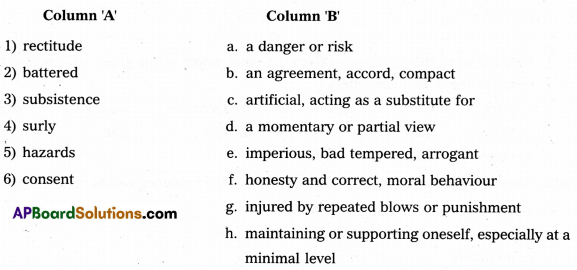
Answer:
1) f
2) g
3) h
4) e
5) a
6) b
XVII. Read the pie-chart of balanced diet and convert it into a paragraph. (1 × 5 = 5)

Answer:
This pie chart shows the balanced diet particulars. There are different food items with their value of proteins in percentage. A person has to select the food items and make them equivalent to 100 percent. Fruits and vegetables have the balance of 25% and 11%. Bread, rice and other starely material shares 35% to 39%. Meat fish, eggs non-dairy source of protein come under the range from 10% and milk and dairy foods get 15%. Thus one has to select the food stuff and make a complete balanced diet.
OR
The number of students in five different classes is like this. 150 students in 8th class, 120 9th class, 170 in 10th class, 100 in 11th class and 110 in 12th class. Represent this data on the bar graph.
Answer:
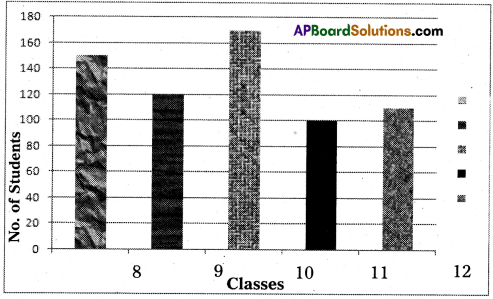
XVIII. Read the following transcriptions and write ANY FIVE words in ordinary spellings. (5 × 1 = 5)
a. /kɅridz/
Answer:
courage
b. /teǝ:k/
Answer:
talk
c. /hæpit/
Answer:
happy
d. /mlaðǝ (r)/
Answer:
mother
e. /li:dǝ(r)/
Answer:
leader
f. /ǝ:də (r)/
Answer:
order
g. /mǝedzistreit/
Answer:
magistrate
h. /p3:Pǝs/
Answer:
purpose
i. /Pi:pl/
Answer:
people
j. /ti:tsǝ (r)/
Answer:
teacher
OR
Find the word that is different from the other words in the group with regard to the sound of the underlined letters:
a. pitch search chloroform
Answer:
chloroform
b. Occasion Location moist
Answer:
moist
c. Success Surgeon Shop
Answer:
shop
d. Cat Car Cal
Answer:
cell
e. mute muscle muslim
Answer:
mute
XIX. Write the number of syllables for ANY SIX of the following words: (6 × ½ = 3)
a. to day
Answer:
Disyllabic
(2 syllables)
b. character
Answer:
Trisyllabic
(3 syllables)
c. revive
Answer:
Disyllabic
(2 syllables)
d. burnt
Answer:
Monosyllabic
(one syllabic)

e. amputate
Answer:
Polysyllabic
(4 syllables)
f. civil
Answer:
Disyllabic
(2 syllables)
g. congratulate
Answer:
Polysyllabic
(4 syllables)
h. weather
Answer:
Disyllabic
(2 syllables)
i. strange
Answer:
Monosyllabic
(one syllabic)
j. good
Answer:
Monosyllabic
(one syllabic)
XX. Complete the following dialogue: (4 × 1 = 4)
Venu : Hi ! Love to see you again!
Anand : Me too …….. I need your ______.
Venu : My advice? Surely. Just tell me what ________
Anand : My hair is unhealthy because all of the split ends. It’s also fallen down.
Venu : Do you often get hair spray?
Anand : Yes I do, Just a couple of weeks ago, I had many dancing performances, so I had to get much _________
Venu : You must use conditioner to maintain your hair healthy. Ok, now I’ll wash your hair and put on some _____.
Anand : Is it possible for coloring after this treatment?
Venu : Why not? You can do it.
Anand : Okay. No problem.
Answer:
Venu : Hi! Love to see you again!
Anand : Me too …….. I need your ____.
Answer: to give some advice
Venu : My advice? Surely. Just tell me what _____
Answer: advoice can I give you?
Anand : My hair is unhealthy because all of the split ends. It’s also fallen down.
Venu : Do you often get hair spray?
Anand : Yes I do, Just a couple of weeks ago, I had many dancing performances, so I had to get much ____
Ans. hair spray
Venu : You must use conditioner to maintain your hair healthy. Ok, now I’ll wash your hair and put on some_
Answer: colour
Anand : Is it possible for coloring after this treatment?
Venu : Why not? You can do it.
Anand : Okay. No problem.
